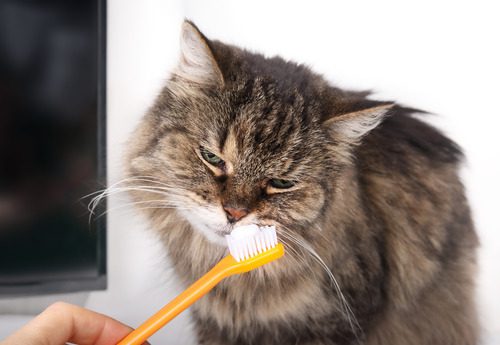Bad Breath in Cats
Bad breath in cats is more than just an inconvenience—it’s often a sign that something deeper is happening with your cat’s health. If you’ve been noticing a persistent, unpleasant odor coming from your feline companion’s mouth, it’s time to dig into the possible causes. While many people chalk it up to normal “cat breath,” the truth is that bad breath can indicate underlying issues that need attention. In this blog, we’ll explore the common causes of bad breath in cats, the potential health implications, and when you should consider reaching out to your veterinarian for help.

What Causes Bad Breath in Cats?
Bad breath in cats, also known as halitosis, often stems from an issue in the mouth, but it can also signal other health problems.
Dental Disease
The leading cause of bad breath in cats is dental disease. Plaque and tartar buildup can lead to gingivitis and periodontal disease, both of which create a breeding ground for bacteria that cause foul odors. Left untreated, these conditions can worsen, resulting in pain, tooth loss, and even systemic infections.
Diet and Eating Habits
What your cat eats can significantly impact their breath. Foods with strong odors or poor-quality ingredients may contribute to bad breath. Additionally, if your cat has a habit of eating unusual items, like garbage or non-food materials, this can also cause a persistent odor.
Oral Infections or Injuries
Infections or injuries in your cat’s mouth can lead to bad breath. For example, a cut, ulcer, or abscess might harbor bacteria that emit unpleasant smells. These issues often go unnoticed until the smell becomes unbearable, making routine oral checks crucial.
Medical Conditions
Systemic health issues like kidney disease, diabetes, or liver problems can manifest as bad breath in cats. For instance, cats with kidney disease might have breath that smells like ammonia, while those with diabetes could have a fruity odor. These conditions require immediate veterinary attention.
Signs That Bad Breath May Be a Health Concern
While occasional bad breath isn’t always alarming, persistent or severe odors should never be ignored. Beyond the smell, other symptoms can help indicate whether your cat’s bad breath is linked to a more significant health issue.
- Changes in Appetite: Cats experiencing pain or discomfort in their mouths may eat less or avoid food altogether. Bad breath accompanied by a sudden decrease in appetite could point to dental disease or oral infections.
- Drooling and Pawing at the Mouth: Excessive drooling or frequent pawing at the mouth are signs that your cat may have oral discomfort. These behaviors, combined with bad breath, often indicate an issue requiring veterinary care.
- Visible Changes in the Mouth: Red or swollen gums, loose teeth, or visible sores are all concerning signs that your cat may have oral health problems. Checking your cat’s mouth regularly can help you catch these issues early.
If you notice any of these symptoms in addition to bad breath, call Lane Veterinary at (630) 320-6644 to schedule an appointment.
How to Effectively Prevent and Manage Bad Breath in Cats
Preventing bad breath in cats involves addressing the root causes and taking proactive steps to maintain your cat’s oral health. Here are some strategies to help manage and reduce the occurrence of bad breath.
Regular Dental Checkups
Annual dental exams can help identify and address oral health problems before they become severe. Your veterinarian will assess your cat’s teeth and gums, clean their teeth if needed, and recommend additional care.
Home Dental Care
While professional cleanings are crucial, home care also plays a significant role in preventing bad breath. Brushing your cat’s teeth regularly with cat-specific toothpaste can help remove plaque and bacteria. Dental treats or chews approved by your vet can also contribute to better oral hygiene.
Diet Adjustments
Feeding your cat a high-quality diet formulated for their age and health needs can minimize bad breath caused by food. Some cat foods are specifically designed to promote dental health by reducing plaque buildup.
Monitoring for Unusual Behaviors
Keep an eye on changes in your cat’s eating habits, behavior, or overall health. Early intervention can prevent minor issues from developing into major concerns.
When Does Your Cat Need Veterinary Attention?
If bad breath in cats persists despite your efforts to manage it, consult with your veterinarian. Chronic halitosis can indicate deeper health concerns that require professional evaluation.
Diagnostic Testing
A thorough veterinary examination, including blood work, dental X-rays, or imaging, can help pinpoint the exact cause of your cat’s bad breath. These tests are especially important if your vet suspects systemic conditions like kidney or liver disease.
Treating Bad Breath in Cats
Dental cleanings, extractions, or antibiotics might be necessary to address dental disease or infections. For systemic conditions, your veterinarian will recommend a tailored treatment plan to manage the illness. At Lane Veterinary, we’re committed to helping your cat live a happy, healthy life. If you’re concerned about your cat’s bad breath, call us today to schedule an appointment.
Supporting Your Cat’s Long-Term Oral Health
Maintaining your cat’s oral health is a vital part of their overall well-being. Regular dental care, a balanced diet, and routine veterinary checkups are the foundation for a healthy mouth and fresh breath. By staying proactive, you can address potential issues early and give your cat the best chance at a long, healthy life. If your cat is struggling with bad breath or other oral health concerns, contact Lane Veterinary at (630) 320-6644 to schedule a visit. Together, we can keep your feline friend feeling their best!
Recent Posts
About Us
Choosing a vet means entrusting your pet’s care and well-being to capable hands. Lane Veterinary strives to be a lifetime vet for you and your family, being the people you can always lean on for support and guidance. As a privately owned practice, we stand to give people and their pets the one-on-one care and attention they deserve in a calm and comfortable setting.
